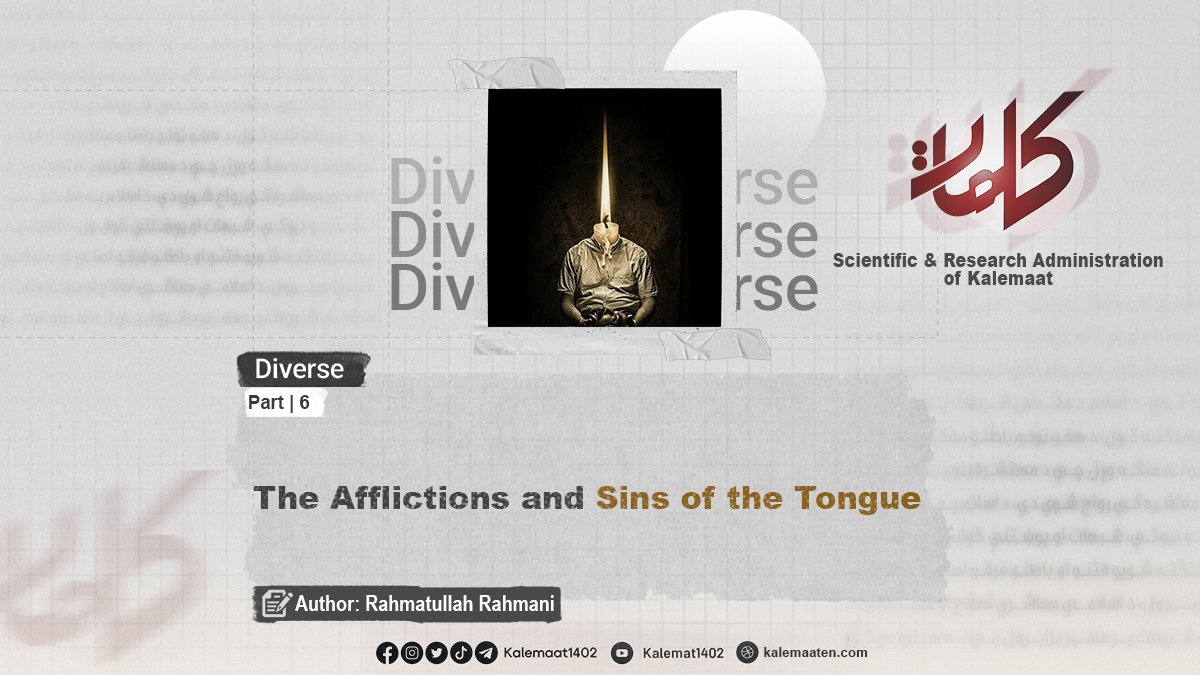Author: Rahmatullah Rahmani
The Afflictions and Sins of the Tongue (Part 6)
The sixth Affliction: Abusing and cursing
One of the worst afflictions of the tongue is abusing and cursing, which lowers a person’s character and degrades a person. Allah Almighty says in Surah Ahzab: «وَالَّذِينَ يُؤْذُونَ الْمُؤْمِنِينَ وَالْمُؤْمِنَاتِ بِغَيْرِ مَا اكْتَسَبُواْ فَقَدِ احْتَمَلُواْ بُهْتَنَا وَإِثْمًا مُّبِينًا» Translation: “Those who harm believing men and believing women without any sin, have committed a flagrant lie and a manifest sin.” [1]
We can conclude from this verse that the people who are abused and insulted are those who have not committed any sin, but false accusations are made against them. This verse can be cited as an argument for condemning abusing and insulting.
The Prophet (PBUH) said: «إيَّاكُمْ وَالْفَحْشَ فَإِنَّ اللَّهَ عَزَّ وَجَلَّ لَا يُحِبُّ الْفَاحِشَ الْمُتَفَحْشَ» Translation: “Beware of abusing and insulting; Because Allah does not like abusing, insulting, and talking bad.” [2]
We have already said that abusing only degrades the character of the one who abuses. It is narrated in a hadith that the Prophet (PBUH) also forbade abusing at the polytheists who were killed in the Battle of Badr, and said: «لا تسبُّوا هؤلاءِ فإنَّهُ لا يخلص إليهم شيء مما تقولون وتُؤذون الأحياءَ ألا إِنَّ البَذاءَ لوْمٌ» Translation: “Do not curse this group, for what you say to them will not reach them, but will rather hurt the living, for it is truly blasphemy and slander that is not condemned.” [3] And in another place, the Prophet (PBUH) said: «سَبَابُ المُومِنِ فُسُوقٌ وَقِتَالُهُ كُفر» Translation: “Insulting a believer is disobedience, and fighting a believer is disbelief.” [4]
Imam Tabari (MABH) said in this regard: “The mention of disobedience and killing with each other in this hadith is because disobedience is a distance from the mercy of Allah, and killing is a distance from the blessings of life.”
Another hadith states: «مِن أكبَرِ الكَبَائِرِ اَن يَسُبَّ الرجُلُ وَالِدَيهِ» Translation: “Among the greatest major sins is that a man curses his parents.” The companions (Sahaba) said: “O Messenger of Allah, how can a man curse his parents?” He said: «يَسُبُّ اَبَا الرجُلِ فَيَسُبُّ الْآخَرُ آبَاهُ» Translation: “He insults someone’s father, and the other insults his father.” [5]
In other words, whoever you insult, you will hear back! Islam is a religion of kindness and compassion. In Islam, everyone’s rights are considered. It does not matter if they are animals or humans. Everyone has rights and privileges. In Islam, insulting and cursing is not allowed, even animals are not allowed. The Prophet (PBUH) said: «لَا تَسُبُّوا الدِّيْكَ فَإِنَّهُ يُوْقِظُ لِلصَّلوة» Translation: “Do not insult the rooster, for it wakes people up for prayer.” [6]
Another narration is from Abu Umamah Bahili that the Prophet (PBUH) said: “Fever is a breath of fire from Hell. “Whatever amount a believer receives, his share of the fire of Hell will be taken away from him and removed.” In another place, it is mentioned that the Prophet (PBUH) went to visit a woman named Umm al-Massayeb, while the woman was writhing in pain and trembling. The Prophet (PBUH) said: “Are you upset?” The woman insulted the illness and fever due to the severity of the fever. The Prophet (PBUH) said to the woman: “Do not curse the fever, for by means of fever the sins of a believer are destroyed, just as the heat of a blacksmith destroys rotten iron. This fever also destroys the sins of a person and purifies him.”
Among the sins that are not forgiven is cursing and insulting the dead without a legitimate reason or religious benefit. The Prophet (PBUH) said about it: “Do not curse the dead; Because they have achieved what they sent before.” [7]
Continues…
Previous Part/ Next Part
[1] ـ Surah Al-Ahzab/ Verse: 55.
[2] ـ Sahih Ibn Hibban “Mention of the Prohibition of Injustice, Obscenity, and Miserliness”/ Hadith Number: 5177.
[3] ـ Narrated by Ibn Abi al-Dunya from the Hadith of Muhammad bin Ali al-Baqir, and narrated by al-Nasa’i from Ibn Abbas (may Allah be pleased with them both). See the takhrij and investigation of this hadith in the book “Al-Mughni ‘an Haml al-Asfar fi Takhrij ma fi al-Ihya’ min al-Akhbar” by Abd al-Rahim bin al-Hussein al-Iraqi/ vol. 3/ p. 150.
[4] ـ Sunan al-Tirmidhi “Chapter on what is said about reviling a believer is wickedness”/ Hadith Number: 1983.
[5] ـ Shu’ab al-Iman al-Bayhaqi, “Chapter on Disobedience to Parents and what has been said about it.” Hadith Number: 7870.
[6] ـ Sunan Abi Dawood “Chapters on Sleep/ Chapter on what has been said about the Rooster and Animals.”
[7] ـ Sahih al-Bukhari, “Chapter on what is prohibited from reviling the dead”/ Hadith Number: (1393) with the words: “Do not revile the dead, for they have reached what they put forward.”



